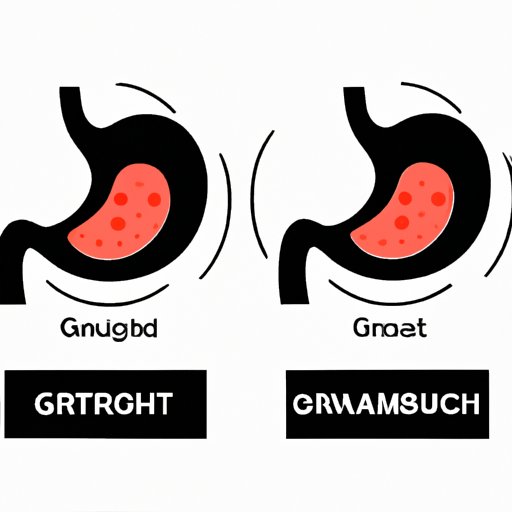Introduction
Stomach growling is a common experience that we’ve all had at some point in our lives. It can be embarrassing and alarming, especially in social situations. But have you ever wondered why your stomach growls when you’re hungry? In this article, we’ll explore the science behind hunger, why stomachs growl, and how to prevent or manage it.
The Science Behind Hunger: Understanding Why Your Stomach Growls
Hunger is a complex physiological state in which the body signals the brain that it needs food. Our bodies have several ways of regulating hunger and satiety, including hormones, enzymes, and the nervous system. The hormone ghrelin is known as the “hunger hormone” because it stimulates appetite, while the hormone leptin signals fullness.
The digestive system, particularly the stomach and intestines, also plays an important role in hunger and satiety. When the stomach is empty, it produces the hormone ghrelin, which signals the brain that it’s time to eat. Conversely, when the stomach is full, it sends signals to the brain to stop eating.
One of the ways the stomach signals hunger is through peristalsis, a series of rhythmic contractions that move food through the digestive tract. When the stomach is empty, these contractions can produce a rumbling or growling sound that we hear as stomach growling.
The Hunger Games: Decoding The Causes of Stomach Growling
Stomach growling is most often associated with hunger, but there are other possible causes as well. When the stomach is digesting food, it can produce similar sounds as air and fluids move through the digestive tract. Other factors that can contribute to stomach growling include dehydration, anxiety, and stress.
In rare cases, stomach growling can also be a sign of an underlying medical condition such as inflammatory bowel disease, lactose intolerance, or celiac disease. If you experience frequent or excessive stomach growling, it’s a good idea to consult with your healthcare provider.
Tummy Troubles: An Exploration Into Why Stomachs Growl When We’re Hungry
Stomach growling can be more noticeable in certain situations, such as quiet environments or when we’re stressed or anxious. It can also be influenced by the types of foods we eat. Different foods and beverages can stimulate the production of acid and enzymes in the stomach, which can contribute to stomach growling.
For example, fatty and spicy foods can irritate the stomach lining and increase acid production, while carbonated beverages can cause trapped gas in the digestive tract. Eating habits and lifestyle choices can also impact stomach growling, such as eating too quickly or consuming large meals.
The Grumbling Truth: Unveiling The Mystery Of Why Our Stomachs Growl
In summary, stomach growling is a normal, physiological response to hunger and digestion. It can be influenced by various factors, including the foods we eat, our eating habits, and our overall health. However, stomach growling is generally not a cause for concern and can be managed through healthy lifestyle choices and dietary adjustments.
If you find that stomach growling is interfering with your daily life, there are several strategies you can try. Eating smaller, more frequent meals throughout the day can help regulate hunger and prevent stomach growling. Drinking plenty of fluids and staying hydrated can also reduce the likelihood of stomach growling.
Empty Stomach, Loud Rumbling: Discovering The Reason Behind Hunger-Induced Growling
There are certain foods that can help prevent stomach growling, such as foods that are high in fiber, protein, and healthy fats. These foods take longer to digest and can help you feel full longer. Examples include whole grains, nuts and seeds, lean proteins, and fruits and vegetables.
When it comes to managing stomach growling in social situations, there are a few things you can try. Bringing a small snack with you, such as a piece of fruit or a granola bar, can help regulate hunger and prevent stomach growling. Choosing foods that are less likely to cause stomach upset, such as plain or lightly seasoned options, can also be helpful.
Conclusion
In conclusion, stomach growling is a normal and natural response to hunger and digestion. While it can be embarrassing or uncomfortable at times, it’s generally not a cause for concern. By understanding the science behind hunger and the factors that contribute to stomach growling, we can take steps to prevent and manage it effectively. With healthy lifestyle choices and dietary adjustments, we can keep our digestive systems healthy and happy.
